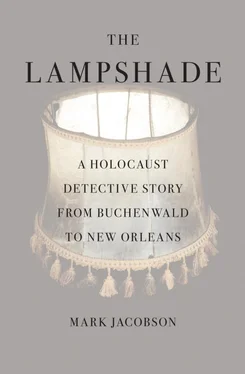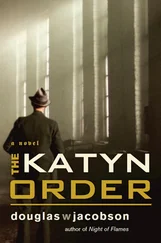“If there was one thing I tried to instill in my krewe, it was some appreciation of art history and taste. You just can’t walk in there and start loading up, grabbing the first thing you see. You got to know the difference between the Italianate styles, because Sicily ain’t Florence, Florence ain’t Rome. You got to check the fingers and the toes, the thin parts, see if it’s marble all the way through. Because a lot of people are cheap. God bless them, but they’re cheap even in death. It could be just cement covered with marble. You don’t want to be out there in the middle of the night stealing fakes. But I know… I can tell things. When it comes to the value of things, what they really are, I got a sixth sense. I’m never wrong.”
That was how he knew about the Nazi lampshade. “I got an eye for antiquities, spot them right off. But you got to find the right buyer, you know. The person who is really going to appreciate an object. The proper fit.”
This was where Skip Henderson came in, Dominici said. “When I saw him coming across the street from Mickey Markey Park, I thought to myself, Oh, here comes one. A fish. All I got to do is put out the line and it’ll be gobble, gobble, gobble. He looked just like the kind of guy who’d buy a Nazi lampshade.”

Dave Dominici in front of his home
Over the next few months I spent a fair amount of time with Dave Dominici, trying to get him to tell me where he got the lampshade.
Originally Dominici told Skip Henderson that he got the lampshade from his dead father, Ralph Dominici, who’d fought his way through Europe after the D-Day landing. His father didn’t talk about the shade much, Dave recalled, only said that it was a “trophy of war” to be handled with extreme care. The problem with this story was that Ralph Dominici, who died in 1975, fought in a war, but it was the Korean War. Later Dominici told me he’d been given the shade for “safekeeping” by a ninety-year-old “Jewish fellow named Cohen with one of those tattoos on his arm” who’d moved to Terrebonne Parish to be the rabbi of a synagogue and “live out his twilight years with his people.” Told there was no synagogue in swampy Terrebonne Parish (Jewish population, circa 2000: 936) with a ninety-year-old rabbi named Cohen, Dominici said, “Okay, I’ll tell you the truth.”
The truth was, he said, that he had been given the lampshade by a legless, wheelchair-bound World War II vet, Master Sergeant Peter Patrick Francis Walsh III, whom he and Gaynielle Dupree had met while they were living in a trailer park on the other side of Lake Pontchartrain outside of Covington, Louisiana. It was an act of forgiveness, Dominici said, explaining that he, being “dope sick,” had robbed Walsh’s trailer, stealing his credit cards. “But I felt bad about it,” Dominici said. “I gave back the stuff. And apologized.” This was why Walsh, then near death, gave him the lampshade, Dominici said. “He wanted to show that he wasn’t mad.”
The farfetchedness of this story, plus the fact that no local veterans’ organization, the VFW, or the American Legion had any record of a Peter Patrick Francis Walsh, did not deter Dominici. Sticking to his story, he wrote out “an affidavit” attesting its truthfulness. Set down in looping cursive on a piece of lined loose-leaf paper, the statement was titled “How I Met Mr. Walsh.”
It said: “Sr. Peter Francis Patrick Walsh III (Covington) (War Vet.)… Bobby Bartholomew, sometimes boyfriend of Mr. Walsh’s drinking buddy, Mrs. Ann Willie Lester. Bobby Bartholomew met his end at the bottom of a railroad track when he decided to end his (considered) worthless life. Committed suicide (alcoholic). This is how I met Mr. Walsh.” Signing the document with his middle name, Ralph, “just to make it more legal,” Dominici said that Bobby Bartholomew had actually died by putting his head on the tracks and having the train run over it, but he didn’t think that was important to mention in his statement. All the rest, however, was gospel, and he offered to go over to Walgreens to get it notarized. I told him this would not be necessary.
I’d about given up on getting anything more out of Dominici when he called me one Sunday morning. Sounding strangely upset, he said if I wanted to hear “the real truth” about how he got the lampshade, I should come over to his house right away.
Meeting me at the door in his Saints wear, Dominici was a wreck. He’d lost his sunglasses and looked like he’d been crying. I don’t know what calamity had befallen him, but something had stolen his swagger. He apologized for sending me on “so many wild goose chases” but said he had no choice after Skip Henderson had come by to tell him about the DNA test. “He said that and I got so freaked out. Ask Gaynielle, it was keeping me up. I was sweating, going nuts.”
He was already the most hated man in New Orleans on account of the cemetery caper, a longtime loser. “If it got around that I had a human skin lampshade, I’ll tell you what would happen. The cops would be over here trying to hang some Hannibal Lecter rap on me. Like I was some kind of sick maniac, a disemboweler and whatnot. Believe me, I have fucked up enough in my life. My moms don’t need to be reading that in the Times-Picayune with the morning coffee.”
The truth was, Dominici said, “It came from the storm. Katrina. That’s how I got it. From Katrina.”
To hear Dominici tell it, the hurricane had left him in a “state of shock, a temporary insanity.” Yes, he’d slept through the storm, but that just made it worse, waking up to a ruined world. “We get up and we’re totally out. No dope. No works. Talk about your junkie nightmare. I come out the door and it’s like everything is destroyed. Trees gone, cars upside down. But when you got to cop, you got to cop. Down here we weren’t flooded. I didn’t have much street water. That kind of fooled me, because the TV is out, so I didn’t hear anything about the levee breaks, I didn’t know about the floods. I just know I got to see Momma Hilda. She was an old black lady with diabetes who sold syringes for one dollar. To her house is just a straight walk up Piety; I done it a thousand times. But now, as I go, I’m seeing the water is getting higher. By St. Claude it’s all over my feet. By Robertson it’s up to my waist. I’m going, what the fuck is this? Because now I’m swimming. I’m swimming through these tree branches, all these articles of clothing. Shoes, eyeglasses, a whole damn shed went by.
“So I finally get up to Momma Hilda’s place, where the water is, like, ten feet high, and I see what looks like this gray bush just bobbing in the water between the shotgun houses. Right away I know it’s Momma Hilda, ’cause she’s got that color hair. She must have fallen off the porch because she couldn’t walk too good and drowned. Poor dear! I pulled her out of the drink. I’m crazy dope sick, but what can you do? She was such a nice lady. I just stayed there crying because it was really awful what was happening. After that I went around, trying to save people, getting into houses, seeing who was alive. I was obsessed, because when it comes down to it, I hate death.”
A couple of days later the National Guard came by Dominici’s house and told him he had to get out. “They got ten guys there with M16s telling us to get our toothbrushes and jump in the truck. That’s all they said. ‘Get in the truck.’ They took us to the airport and put us on a plane. Never said where we were going. I’m screaming, ‘Ain’t this supposed to be America?’ Nobody gave two shits about that. They took us to Knoxville, to some fucked-up Beverly Hillbillies housing project. I’m yelling I got to go back to New Orleans, New Orleans, Louisiana, that’s my home. They said to shut up, there was no such thing as New Orleans anymore and I should be glad to be in Tennessee.”
Читать дальше













